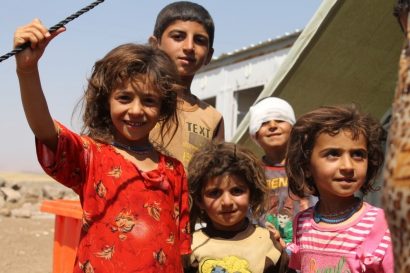Tag: Education in emergencies
This topic guide is designed to support DFID advisors, education specialists, and other partners working on providing education for refugees and Internally Displaced Persons (IDPs). It provides an overview of the key issues, and signposts relevant sources for further information and reading. Section 1 provides a brief introduction to the guide. Section 2 gives a global overview of forced displacement and education. Section 3 maps the state of research, policy, and practice in refugee education. Section 4 maps the state of research, policy, and practice in IDP education. Section 5 seeks to identify and explore best practice, and existing and potential future opportunities and innovations, in the field of education and forced displacement. Read more
The INEE Guidance Notes on Teacher Compensation in Fragile States, Situations of Displacement and PostCrisis Recovery (INEE Guidance Notes) were developed to address this critical challenge to quality education, and as such, provide a suggested framework for compensating teachers. They are organised around three themes: policy and coordination of teacher compensation; the management and financial aspects… Read more
This report starts by giving an overview of internal displacement in Turkey. Next, the paper looks at Turkish laws relating to the right to education and to discrimination, examining how discrimination impairs the education if internally displaced children. Thirdly, the paper discusses the consequences of the socio-economic impact of displacement on their education. Finally, the… Read more
The Sixth Commonwealth Teachers’ Research Symposium brought together education researchers, practitioners and policy-makers to share experiences from developed and developing countries both within and outside the Commonwealth. This collection of papers from the event examines current trends in teacher migration, including education in emergencies, forced migration and pan-African migration, in line with the current global… Read more
These guidelines describe the criteria for eligibility for accelerated funding from the Global Partnership, as well as the grant implementation period and the activities eligible for funding.
Theoretically derived factors (preexisting child characteristics, trauma exposure, caregiver– child relationship, and school-based mental health programming) were examined as potential correlates of distress in children residing in the region closest to the epicenter of the 2010 Chilean earthquake. One year before the earthquake, 2nd-grade students who attended 9 schools that provide government-run mental health intervention… Read more
Children in northern Uganda have undergone significant psychosocial stress during the region’s lengthy conflict. A Psychosocial Structured Activities (PSSA) programme was implemented in 21 schools identified as amongst those most severely affected by conflict-induced displacement across Gulu and Amuru Districts. The PSSA intervention comprised a series of 15 class sessions designed to progressively increase children’s… Read more
This report describes the impacts of the winter cash transfer programme run by UNHCR and partners from November 2013 to April 2014. The programme gave $575 USD via ATM cards to 87,700 registered Syrian refugees in Lebanon with the objective of keeping people warm and dry during cold winter months. This research measured the impacts… Read more
With tens of millions affected, and nearly one third of those out of school in crisis affected countries, neglecting the education of these children and youth denies not only their future, but also the future of societies where they live. Education in emergencies and protracted crises can provide safes paces during crises, and is crucial… Read more
A common strategy for supporting basic education in emergencies, including in IDP camps, has been the “school in a box” approach. One of the earliest uses of this approach was in the late 1980s by the Sudan Open Learning Organisation, supporting schools set up in informal IDP camps around Khartoum. Sudan Open Learning Organisation’s (SOLO)… Read more
This report examines the influences on educational programming in conflict-induced emergencies. It questions whether standardised interventions are appropriate and effective educational responses, and focuses on child-friendly spaces, school-feeding programmes, and pre-packaged education kits. It draws on a review of literature, and the country studies of Sudan, Lebanon, Uganda, and Timor-Leste.







